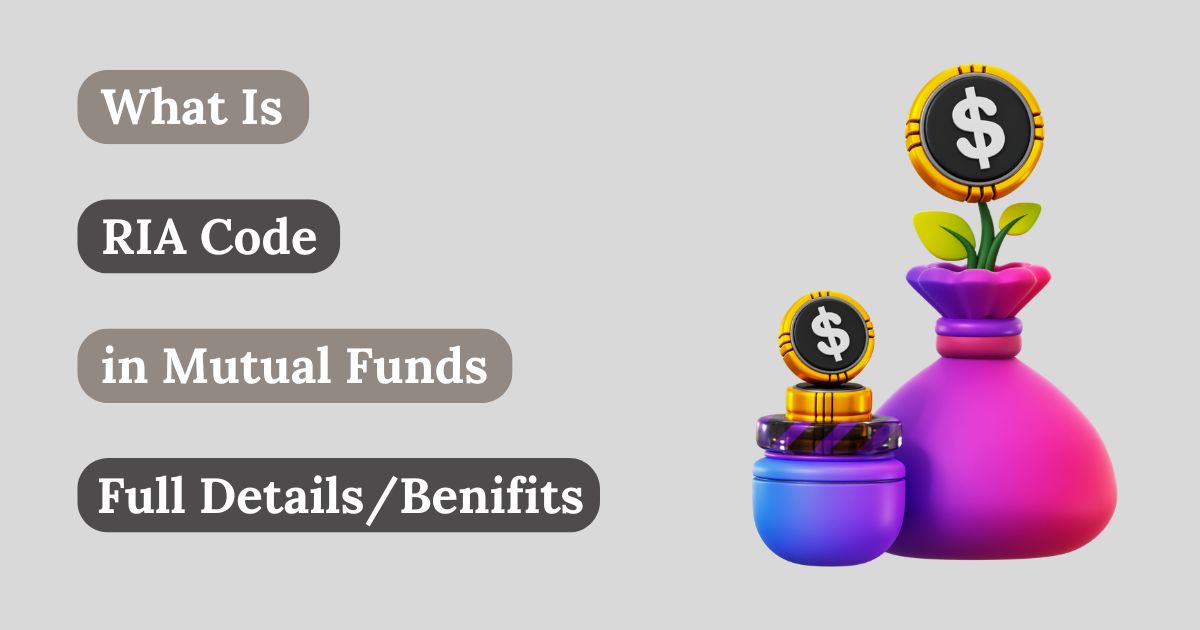Investing in mutual funds is an effective method for people to build wealth through various financial portfolios. To make sure that investors receive proper financial advice, an investment advisor registration system is in place, particularly for those who specialize in mutual funds.
The term RIA Code in mutual funds refers to a unique identity assigned to Registered Investment Advisors (RIAs) who have been approved by the Securities and Exchange Board of India (SEBI) to provide professional investment advice.
In this post, we’ll explore what the RIA code means, how to get it, how important it is in the financial world, and how it protects investors.
How to Get an RIA Code in Mutual Funds?
To become a Registered Investment Advisor (RIA) and receive an RIA code, the following processes must be followed:
1. Educational Qualifications
Meeting SEBI’s educational requirements is an essential requirement for getting an RIA code. The applicant must hold a degree in finance or a related subject. Common acceptable degrees include:
- Chartered Accountant (CA)
- Chartered Financial Analyst (CFA)
- MBA in finance or investment-related fields
Any postgraduate degree in finance, economics, or accounting
In addition to academic qualifications, SEBI may also accept professionals with certifications like CFP (Certified Financial Planner) or other relevant certifications.
2. Experience in the Financial Industry
Obtaining an RIA code also requires significant job experience in the financial sector. SEBI requires at least five years of professional experience in financial services, including mutual funds, stock markets, insurance, and wealth management. This ensures that the candidate has the necessary practical knowledge to offer solid suggestions.
3. Certification Exams
Passing the required certification examinations is an important step towards earning the RIA code. SEBI requires students to pass the NISM (National Institute of Securities Markets) certification tests necessary for investment professionals.
- Investment advisory regulations
- Ethics in financial advisory services
- Investment planning and client risk assessment
Passing these exams proves that the advisor has the necessary skills to operate as a Registered Investment Advisor.
4. SEBI Application Process
Once the educational, experience, and certification requirements have been fulfilled, the advisor must apply to SEBI to register. The application requires submitting necessary documents such as educational qualifications, experience verification, exam results, and a fee. Following a thorough investigation, SEBI issues the RIA code, allowing the advisor to legally practice as a Registered Investment Advisor.
This registration not only validates the advisor’s operations but also informs clients that the individual is qualified to provide professional advice, especially on mutual funds.

What Does RIA Code Mean in Mutual Funds?
The RIA Code in mutual funds is a unique identification provided by SEBI to Registered Investment Advisors that shows that the advisor is legally permitted to provide investment advice. This is of particular importance in the mutual fund industry, where an expert is sometimes needed to negotiate the complexities of different funds, risk levels, and market conditions.
Fiduciary Responsibility
One of the key responsibilities that come with the RIA code is adhering to fiduciary duty. This means that advisors with the RIA code must operate in their customers’ best interests. Unlike distributors, who may have problems of interest due to commissions or other financial incentives, RIAs must provide objective advice.
Fee-Based Structure
Instead of collecting commissions from financial products, the majority of RIAs operate on a fee basis. This ensures that the consumer is not directed to specific mutual funds due to commission-based incentives. As a result, the advice provided by an RIA is usually more objective, focusing only on the client’s best interests.
SEBI Regulations
Having an RIA code also means that the advisor has to conform to SEBI’s strict regulations, which are intended to protect investors. SEBI oversees advisors to ensure that they follow ethical rules, preserve customer openness, and operate within a regulatory framework that supports financial market fairness.
RIA Code in Mutual Fund Example
To explain the concept of the RIA code in mutual funds, consider the following real-world example:
Consider the following scenario: As an investor, you want to establish a long-term financial portfolio using mutual funds. You choose to meet with a financial advisor to help you select the best funds depending on your financial objectives, risk tolerance, and market conditions. During your investigation, you meet two categories of advisors:
A mutual fund distributor who receives commissions for the products they offer.
An RIA is a person who has an RIA code and charges a set fee for their services.
You decide to cooperate with the RIA because you believe their advice will be indifferent. Using their experience and your financial profile, the RIA suggests a balanced portfolio of equities and debt mutual funds that are consistent with your risk tolerance and long-term financial objectives. There is no conflict of interest because the RIA’s income comes completely from the fees you pay. The advice you receive focuses only on what is best for you.
This example shows how dealing with an advisor who has an RIA code in mutual funds ensures that the advice you receive is objective, suitable for your specific needs, and free of outside pressures.
Importance of RIA in Mutual Funds
Registered Investment Advisors (RIAs) help investors make informed decisions about mutual fund investments. Their importance can be divided into the following aspects:
1. Professional guidance: RIAs bring years of experience and knowledge of financial markets to the table. Their advice helps investors, especially beginners, manage the complexity of mutual funds. Whether it’s choosing funds based on risk tolerance, market trends, or financial objectives, RIAs provide personalized advice that can greatly improve an investor’s financial security.
2. Fiduciary Standard: RIAs are governed by a fiduciary standard, which means they are legally compelled to prioritize their client’s interests before their own. This sets them apart from commission-based consultants, guaranteeing that the advice they provide is always in the client’s best interests, without the influence of hidden agendas.
3. Regulatory oversight: SEBI’s regulation of RIAs guarantees that these experts follow strict ethical guidelines. Regular audits, compliance inspections, and commitment to transparent pricing structures establish RIAs as reliable professionals. Investors can feel easy knowing that their counsel is responsible to a managing authority.
4. Holistic Financial Planning: While mutual fund distributors may specialize in selling mutual fund products, registered investment advisors (RIAs) frequently provide more extensive financial planning services. Aside from mutual fund guidance, they may help with other parts of financial planning, such as tax planning, retirement planning, and estate administration. This balanced approach allows investors to develop a well-rounded financial strategy.
Is RIA available in India?
Yes, the RIA code system is accessible in India and is regulated by SEBI under the SEBI (Investment Advisers) Regulations, 2013. The system was implemented to increase transparency and professionalism in the financial advisory industry, guaranteeing that investors obtain high-quality, ethical financial advice.
Individuals and organizations in India seeking investment advice services must register with SEBI and receive an RIA code. The law applies to financial consultants who advise on items such as mutual funds, stocks, bonds, insurance, etc. The purpose of this system is to protect investors’ interests by requiring advisors to follow professional standards.
Is RIA Money Safe?
Investing through an RIA gives an extra layer of security to your financial decisions, according to the regulated framework under which they operate. Here are a few reasons why partnering with an RIA keeps your money safe:
1. Regulated by SEBI
SEBI controls RIAs to ensure they meet industry norms and ethical standards. This gives investors confidence that their advisor is not acting in a legal vacuum, but rather under the supervision of a responsible authority.
2. Fiduciary Duty
The fiduciary duty of RIAs ensures that they always prioritize their clients’ interests. This implies that the advice you receive from an RIA is solely focused on helping you in meeting your financial objectives, with no hidden incentives.
3. Transparency
RIAs maintain a high level of transparency. They must disclose their rates upfront so that clients understand the cost of services and may make educated decisions.
4. Client-Centric Approach
Because RIAs are not motivated by commissions, the advice they provide is honest. You may trust that an RIA’s mutual fund recommendations are based on your financial needs, not on external pressure from product distributors.
Conclusion
In conclusion, the RIA code in mutual funds represents trust, professionalism, and moral standards. Registered Investment Advisors provide accurate, independent advice to investors as they navigate the often-complex world of mutual funds.
By conforming to SEBI standards and providing transparent services, RIAs ensure that investors may make educated decisions with trust. Whether you’re new to mutual funds or an experienced investor, speaking with an RIA can help you improve your financial strategy and maintain your investments. You can improve your financial understanding by reading books on mutual funds or reading financial company blogs.

